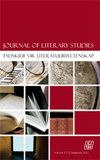唯我论的突破还是阻碍集体?奥古斯特威尔逊电台高尔夫的历史决斗。
IF 0.1
4区 文学
0 LITERARY THEORY & CRITICISM
引用次数: 0
摘要
奥古斯特·威尔逊通过虚构的戏剧叙事成为最重要的非裔美国人历史编年史家之一,这一点毋庸置疑。威尔逊完成了这个计划,他写了一个由十部戏剧组成的循环,每一部戏剧都代表了20世纪非洲裔美国人经历的每十年中的一个重要时刻。奥古斯特·威尔逊(August Wilson)的十部剧连续不断地戏剧化了非裔美国人发现自己在历史上的十字路口,当他们考虑在解放后的美国走上一条不断寻求繁荣和建立持久自我认同的道路时。威尔逊的戏剧经常设置敌对力量之间的决斗,代表了保留旧的土地和过去的身份之间的冲突,以及与过去决裂并重新开始的必要性。在威尔逊的十场比赛周期结束时,《高尔夫电台》以一种让人想起意识危机的方式最深刻地表现了这些历史上的决斗,这种危机一直困扰着非裔美国人,他们在20世纪寻求做出正确的历史选择。这种意识危机,被威廉·杜波依斯恰当地描述为一种“双重意识”的形式,使得非裔美国人很难在这些历史的十字路口做出简单的选择。威尔逊的《电台高尔夫》用一些人物来表现这场决斗,这些人物一方面戏剧化了美国梦初期的唯我论和随之而来的资本主义突破的可能性之间的冲突,另一方面则是一种可能阻碍个人进步的集体历史感。本文章由计算机程序翻译,如有差异,请以英文原文为准。
Solipsistic breakthroughs or stymying collectives? Historical duels in August Wilson’s Radio Golf.
August Wilson’s place among the most significant chroniclers of African American history through the medium of fictional dramatic narratives is certainly not in doubt. Wilson consummated this through a project to write a cycle of ten plays, each one representing a significant moment in every decade of African American experience during the 20th Century. August Wilson’s ten-play cycle constantly dramatises the historical cross-roads at which African Americans have found themselves as they contemplate which path to take on a ceaseless quest to find prosperity and establish enduring identities of the self in post-emancipation America. Wilson’s plays often set up duels between antagonistic forces that represent the conflict between retaining old ground and identities of the past, and the imperative to break with the past and start afresh.
Coming at the end of Wilson’s ten-play cycle, Radio Golf most poignantly represents these historical duels in ways that are reminiscent of the crisis of consciousness that has persistently assailed African Americans in their quest to make the right historical choices during the 20th Century. This crisis of consciousness, so aptly described by William Du Bois as a form of ‘double consciousness’ makes it difficult for African Americans to make an easy choice at these historical cross-roads. Wilson’s Radio Golf, presents this duel using characters who dramatise the conflict between the incipient solipsism of the American Dream and its attendant possibilities for capitalist breakthroughs on the one hand, and on the other a sense of collective history that could potentially stymy individual progress.
求助全文
通过发布文献求助,成功后即可免费获取论文全文。
去求助
来源期刊

Journal of Literary Studies
Multiple-
CiteScore
0.50
自引率
0.00%
发文量
0
期刊介绍:
The Journal of Literary Studies publishes and globally disseminates original and cutting-edge research informed by Literary and Cultural Theory. The Journal is an independent quarterly publication owned and published by the South African Literary Society in partnership with Unisa Press and Taylor & Francis. It is housed and produced in the division Theory of Literature at the University of South Africa and is accredited and subsidised by the South African Department of Higher Education and Training. The aim of the journal is to publish articles and full-length review essays informed by Literary Theory in the General Literary Theory subject area and mostly covering Formalism, New Criticism, Semiotics, Structuralism, Marxism, Poststructuralism, Psychoanalysis, Gender studies, New Historicism, Ecocriticism, Animal Studies, Reception Theory, Comparative Literature, Narrative Theory, Drama Theory, Poetry Theory, and Biography and Autobiography.
 求助内容:
求助内容: 应助结果提醒方式:
应助结果提醒方式:


